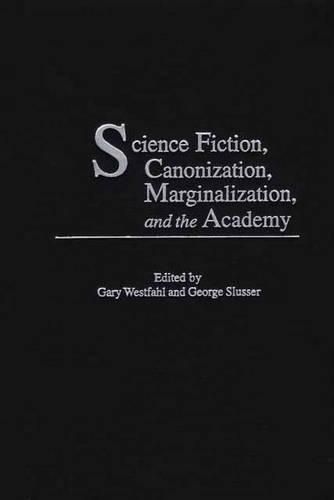
Science Fiction, Canonization, Marginalization, and the Academy
(Hardback)
Publishing Details
Science Fiction, Canonization, Marginalization, and the Academy
By (Author) Gary Westfahl
Edited by George Slusser
Bloomsbury Publishing PLC
Praeger Publishers Inc
30th January 2002
United States
Classifications
Tertiary Education
Non Fiction
Literary studies: fiction, novelists and prose writers
Science fiction
809.38762
Physical Properties
Hardback
192
Description
Expert contributors discuss the marginalization of science fiction by literary critics and the tendency to exclude science fiction from the canon. Science fiction occupies a peculiar place in the academic study of literature. For decades, scholars have looked at science fiction withdisdain and have criticized it for being inferior to other types of literature. But despite the sentiments of these traditionalists, many works of science fiction engage recognized canonical texts, such as the Odyssey, and many traditionally canonical works contain elements of science fiction. More recently, the canon has been subject to revision, as scholars have deliberately sought to include works that reflect diversity and have participated in the serious study of popular culture. But these attempts to create a more inclusive canon have nonetheless continued to marginalize science fiction. This book examines the treatment of science fiction within the academy. The expert contributors to this volume explore a wide range of topics related to the place of science fiction in literary studies. These include academic attitudes toward science fiction, the role of journals and cultural gatekeepers in canon formation, and the marginalization of specific works and authors by literary critics. In addition, the volume gives special attention to multicultural and feminist concerns. In discussing these topics, the book sheds considerable light on much broader issues related to the politics of literary studies and academic inquiry.
Reviews
"This collection will be useful for anyone teaching or writing about science fiction. It could also offer food for thought to those who dismiss science fiction, but of course they are the people least likely to read it....[T]hese essays, taken together, form a genuine dialogue, with all the irriation involved in actually having to listen to the "other side." No one will like more than half of them. But as collections go, that is not a bad average. Theeditors are to be commended for creating the space for a genuine exchange, something all too rare."-SFRA Review
This collection will be useful for anyone teaching or writing about science fiction. It could also offer food for thought to those who dismiss science fiction, but of course they are the people least likely to read it....[T]hese essays, taken together, form a genuine dialogue, with all the irriation involved in actually having to listen to the "other side." No one will like more than half of them. But as collections go, that is not a bad average. Theeditors are to be commended for creating the space for a genuine exchange, something all too rare.-SFRA Review
Author Bio
Gary Westfahl is adjunct professor at the University of La Verne, CA. His previous books include No Cure for the Future (2002), Unearthly Visions (2002), Worlds Enough and Time (2002), Science Fiction, Canonization, Marginalization, and the Academy (2002), Science Fiction, Children's Literature, and Popular Culture (2000), Space and Beyond (2000), and Cosmic Engineers (1996), all available from Greenwood Press. George Slusser is professor of comparative literature at the University of California, Riverside. He has written several books about science fiction authors and coedited numerous scholarly studies.
